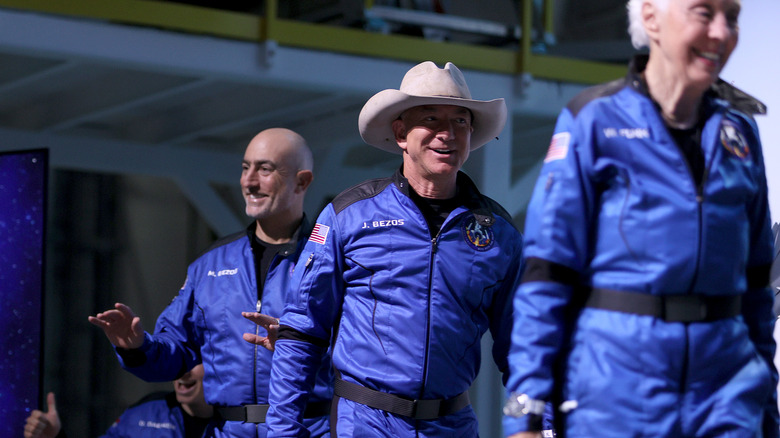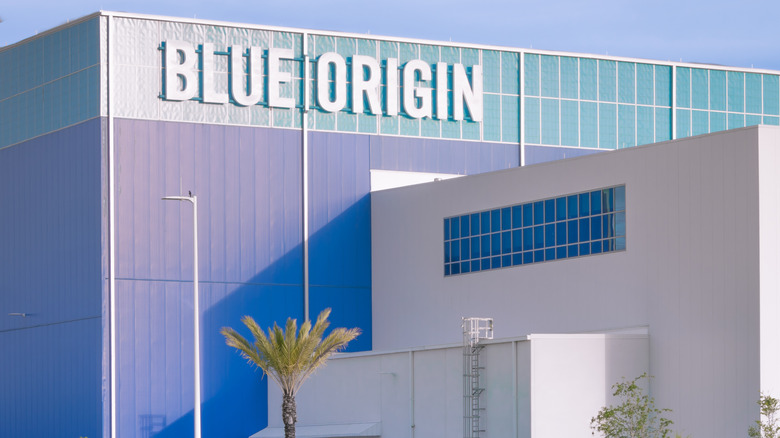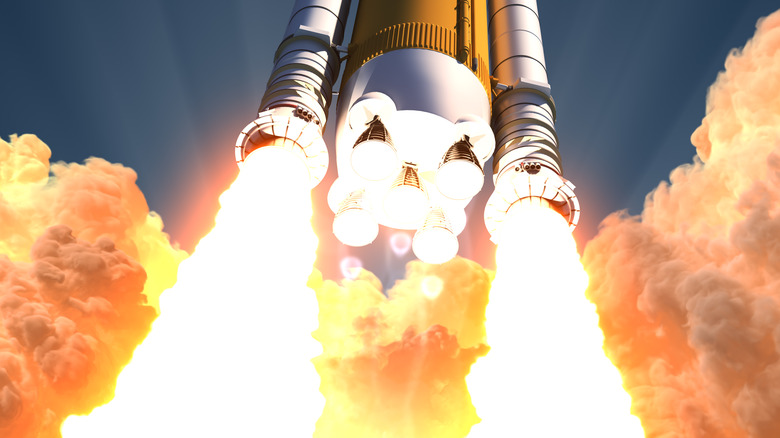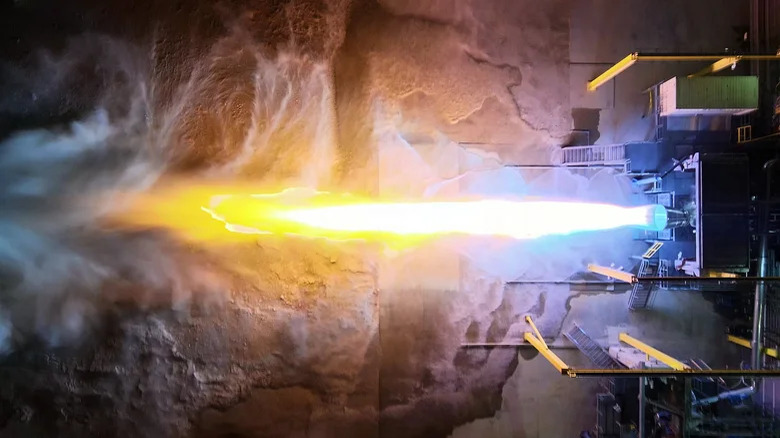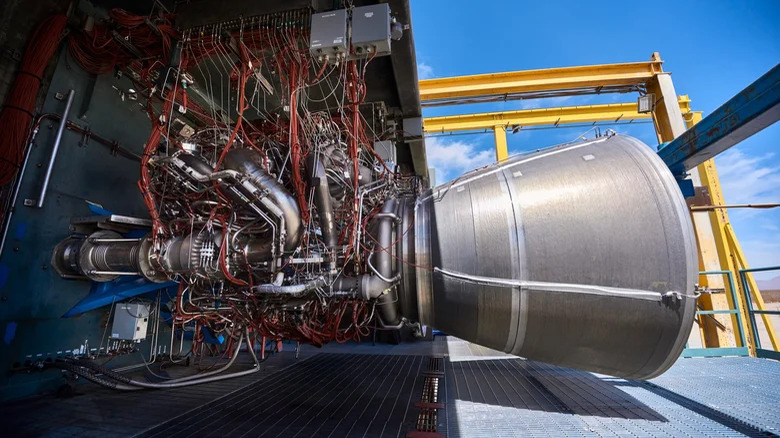Jeff Bezos Details The Specs Of Blue Origin's Latest Rocket And When It's Going To Launch
We have new insight into the Billionaire Space Race thanks to a conversation former Amazon and current Blue Origin CEO Jeff Bezos had with podcaster Lex Fridman. During the chat, Bezos spoke extensively about New Glenn, the rocket Blue Origin is developing to directly compete with SpaceX's Falcon X — all before sharing what he really thought about his spacefaring rival Elon Musk.
New Glenn is aimed at pushing boundaries while also cutting costs per launch, or at least that's what Blue Origin intends it to be. Seven proven and reusable BE-4 engines power the rocket's first stage before two BE-3U engines capable of generating 320,000 lb-ft of thrust between them take over. The rocket draws heavily on spacefaring heritage, and Bezos points out that many of its features aren't too far removed from the kinds of designs that powered the Apollo missions of the 1960s, although many parts of it are also very forward-looking.
During his conversation with Fridman, Bezos explained that he remains grateful for the foundations and infrastructure that were in place when he entered the business world. Now he's attempting to put similar infrastructure in space for space missions, hypothesizing that one day space startups could launch from dorm rooms, much like companies like Amazon could due to things like the internet existing. Bezos confirmed and elaborated on some of the details we already knew about the rocket, as well as giving more information on its potential first launch date, manufacturing methods, and safety measures.
Size matters to Bezos
Blue Origin is going big with its upcoming rocket. The 320-foot-tall New Glenn is one of the largest vehicles ever constructed. "Rockets love to be big," says Bezos when talking about the upcoming vessel. The billionaire also spent some time talking about how magnificent the hours-long process of setting up the rocket on the launch platform looks.
Although he did not understate the increased complexity that comes with scaling everything up there are advantages, Bezos claims, to a larger rocket. Obviously, a larger rocket can handle a larger payload, and this is one of the areas where Blue Origin's rocket is attempting to outshine its rivals. One of the key plus points is how it deals with parasitic mass — which is a measure of all weight carried in onboard components and other items not considered payload — which Bezos describes as a major factor with smaller rockets and "trivial" on the larger vehicles.
However, a lot of the design principles of New Glenn still involve reducing the amount of parasitic mass the rocket has. Since any measure of parasitic mass adds weight to the rocket, that means more thrust and fuel are needed to get the thing into space. However, Bezons explained that techniques like friction stir welding help control additional mass by joining two pieces of metal without melting either piece. The resulting weld is also as strong as the material it is joining, meaning weight doesn't have to be added to mitigate any weak spots.
New Glenn uses two types of fuel
The rockets powering New Glenn use a couple of different fuel types as they blast toward space. During the interview, Bezos spoke about the virtues of liquid hydrogen, which New Glenn uses in its later stages. Some rockets use liquid hydrogen on all stages, which Bezos points out there's technically nothing wrong with. As the Blue Origin owner points out: "It's operationally very capable but not very cost-effective." So, in a bid to increase efficiency, New Glenn takes a different approach to the initial launch.
Liquid natural gas combined with liquid oxygen is used to get the rocket into the sky, and when the craft is airborne it switches to liquid hydrogen from the next stage onward. The benefit of hydrogen, as Bezos explains, is its weight. Even in liquid form, the universe's lightest element weighs very little. The billionaire also believes adding the liquid natural gas stage first gives his rocket an edge in terms of efficiency.
We could see the first test launch in 2024
According to Bezos, the first test launch of New Glenn is still set to go ahead at some point in 2024. The rocket's first flight was initially scheduled for 2021 but was delayed until the end of 2022 and then pushed back to 2024, although it remains uncertain is the payload the rocket will carry. Escapade, the module that will ultimately study the potential of solar wind energy on Mars, might be part of that first launch, but Bezos was unable to confirm either way.
The billionaire said he was "not 100% certain what payload will be on that first launch." However, he was able to outline Blue Origin's goals for the next few missions, summarising, "For sure, the first launch. We'll see if Escapade goes on that or not." There are "other things" that could be on the rocket if Escapade doesn't make it. Still, it is likely that the public — and perhaps even Bezos himself — won't find out what the rocket will be carrying until closer to the eventual launch date.
Problems could still arise
Despite being close to launch, problems could still surface with the rocket — even after liftoff.
Bezos mentioned that while New Glenn has been thoroughly tested and numerous simulations have been run so far, "there are some problems you can only find in flight." This is something rivals SpaceX will be only too aware of. Earlier in 2023, the first test flight of the company's Starship rocket ended in what many would class as a disaster, but SpaceX described as a "rapid unscheduled disassembly." The liftoff itself went well, but a few minutes into the flight, the first stage separation failed and the test ultimately ended in a fireball.
While a manned New Glenn flight may still be a long way off, safety procedures are in place to protect the lives on board if something goes wrong. Bezos outlined the safety precautions and reiterated his trust in the safeguards along with the engineers who designed them. The failsafes essentially give the people on board a way to escape if a stage separation failure occurs. In that event, the module containing actual humans will separate and blast off from the rocket, hopefully keeping all on board safe from harm. Bezos pointed out that these sorts of escape routes aren't new, and all human-crewed spacecraft — bar the space shuttle — have had them.
